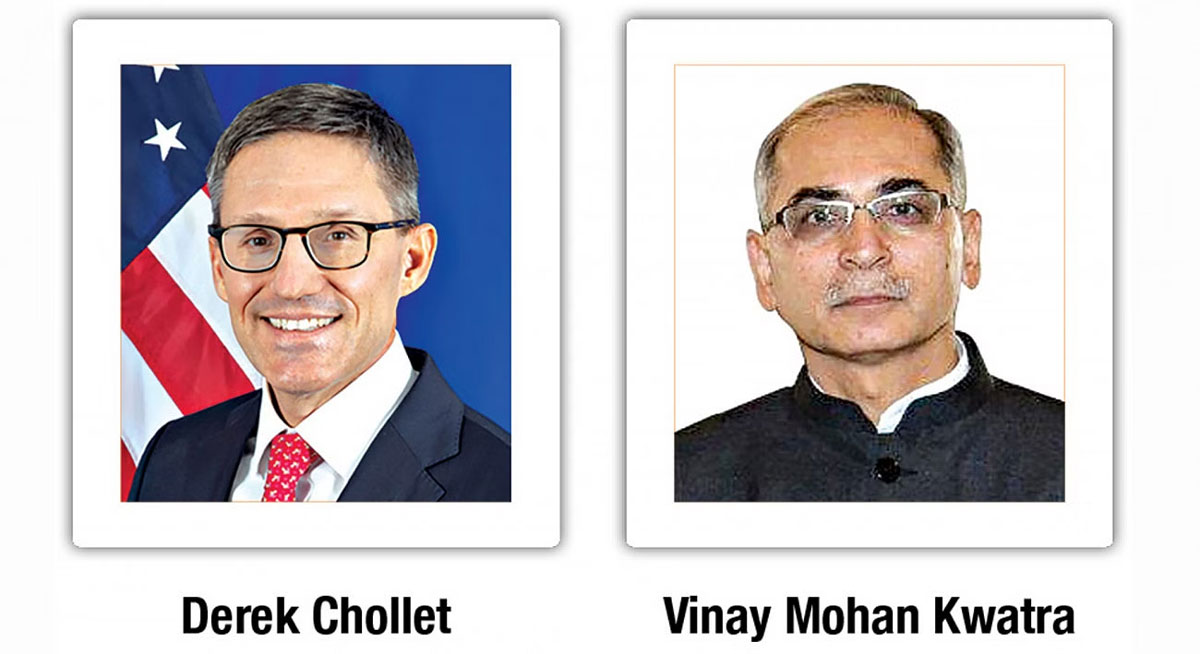Reading Time: 3 minutes
Two high-level foreign officials — US State Department Counselor Derek Chollet and Indian Foreign Secretary Vinay Mohan Kwatra — are expected to arrive in Dhaka today.
While Chollet’s visit may prominently feature the Rohingya crisis and promoting democracy in Myanmar, Kwatra will hold the foreign office consultation to discuss bilateral relations ahead of Prime Minister Sheikh Hasina’s visit to New Delhi to attend the G20 Summit in September, said diplomatic sources.
During his two-day visit, Chollet, an official of the rank of an under-secretary, will meet Foreign Minister AK Abdul Momen. He is expected to call on PM Hasina.
Chollet’s visit comes on the heels of a series of senior US officials’ tour to Bangladesh in recent months. In January alone, Eileen Laubacher, senior director for South Asia at the US National Security Council, and Donald Lu, US assistant secretary for South and Central Asia, visited Dhaka.
Though Bangladesh and the US have a robust relation, it was strained following the sanctions against the Rab and seven of its current and former officials in December 2021.
Initially, Dhaka was in a mode of denial, but eventually it said it may have some mistakes and will be making corrections when required.
Lu, during his visit, lauded Bangladesh for the reduced number of extrajudicial killings and enforced disappearances.
While Washington is critical of Bangladesh’s 2018 national polls, media freedom, space of the civil society organisations, it is keen to deepen engagement with Dhaka given its geostrategic location in the Indo-Pacific region, which is becoming a place of competition among the global powers.
“Mr Derek Chollet is expected to discuss the ways of bolstering US-Bangladesh relations. Especially, he will learn of the Rohingya situation on the ground and the humanitarian response,” Seheli Sabrin, spokesperson for the foreign ministry, told reporters last week.
A US delegation on Sunday started visiting the Rohingya camps in Cox’s Bazar.
Diplomatic sources said the US is attaching increased importance to promoting democracy in Myanmar, and helping Rohingyas, with more than one million living in Cox’s Bazar camps.
In December last year, the US Congress passed the BURMA Act meant to impose tougher sanctions against the regime leadership, support the pro-democracy movement and provide critical humanitarian assistance.
A diplomatic source said the US has been the largest donor for the Rohingyas sheltered in Bangladesh, and under the BURMA Act, it is mandated to bolster support at a time when the humanitarian assistance for the Rohingyas is declining amid Russia-Ukraine war.
Washington is urging all the regional countries, including South Asian and Southeast Asian ones, to create pressure on Myanmar junta, which took control of the country through a coup two years back. However, the civilian National Unity Government (NUG) and other rebel groups now control about 80 percent of the country’s territory.
Diplomatic sources said Washington wants Dhaka on its side as it supports the NUG and pro-democracy groups of Myanmar.
Foreign ministry officials said Dhaka will request Washington to lift sanctions, and support Bangladesh in addressing Rohingya crisis. It will also seek more US investments and transfer of technologies to adapt climate change challenges.
Meanwhile, Indian Foreign Secretary Kwatra will arrive in Dhaka on a two-day visit today evening, ending an official visit to Nepal.
Bangladesh Foreign Secretary Masud Bin Momen will hold foreign office consultation (FOC) with his India’s counterpart tomorrow.
Foreign ministry officials said Dhaka and Delhi will take stock of all aspects of Indo-Bangla relations and discuss preparations for the upcoming visits of Foreign Minister Momen to New Delhi early March to attend the G20 foreign minister’s level meeting and PM Hasina’s visit to Delhi on September 9-10.
G20 is the premier forum for international economic cooperation.
Kwatra is also expected to call on Hasina and Momen.
Hasina may hold a bilateral meeting with her Indian counterpart Narendra Modi on the sidelines of the summit.
From the Bangladesh side, addressing trade barriers and increasing export to India, Comprehensive Economic Partnership Agreement and taking forward water-sharing issues of the common rivers will feature prominently in the FOC, officials said.

